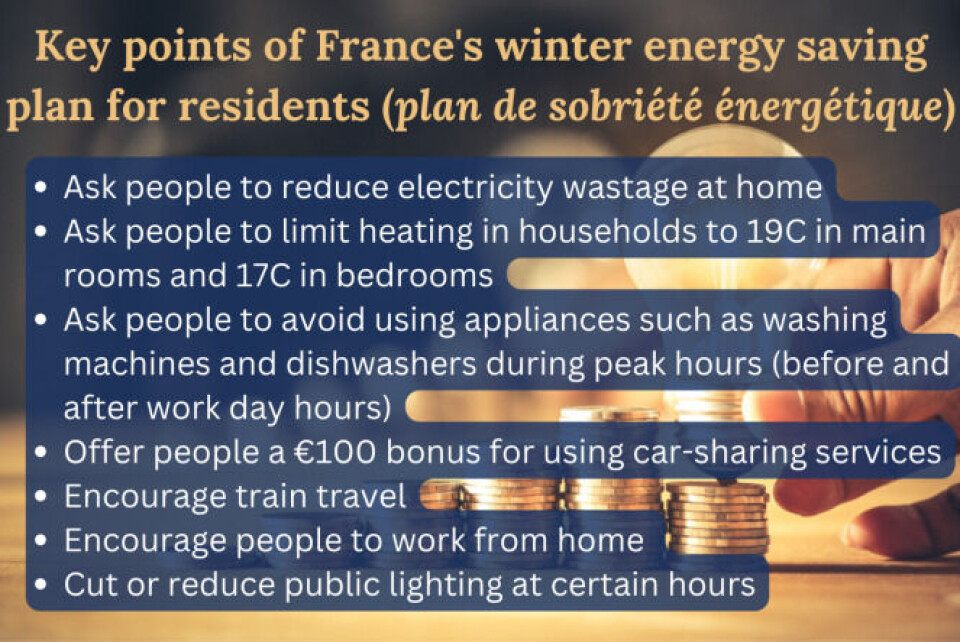-
Pistes closed, confinement orders: Alpine resorts deal with avalanche risk
Increased snowfall this weekend may cause further closures as busy school holiday season continues
-
Former French Interior Minister announces 2027 presidential candidacy
Bruno Retailleau recently asked prefectures to be tough on immigration
-
Ryanair axes Dublin-Rodez route but London connection retained
“We are disappointed but had no say in decision” say airport authorities
Heating, transport, télétravail: What is France’s energy saving plan?
Dozens of measures to cut energy consumption have been announced – we look at the key points that will affect you

France’s government yesterday (October 6) announced a sweeping range of measures aimed at saving energy this winter and in the medium-to-long term as part of an €800million plan called the plan de sobriété énergétique.
The aim is for the country to reduce its energy consumption by 10% over the next two years.
Read more: France sets out winter energy saving plan for residents and businesses
The measures, announced by nine different ministers and Prime Minister Élisabeth Borne, target various sectors including energy, transport, housing, business, public services, sports and tourism.
Ms Borne said that “general mobilisation” is what will get results, reiterating that everyone has a part to play.
She also promised that the government would publish each week the country’s gas and electricity consumption rates to gauge how much has been saved and where more work needs to be done.
While the measures are mainly targeted at businesses and public services, individuals are also being asked to contribute.
There are no strict rules and the government is asking people to take responsibility for their actions, rather than imposing laws on them.
France’s Energy Transition Minister Agnès Pannier-Runacher said that she was looking for companies, public services and local authorities to take responsibility for saving energy. She said that “there will be no temperature police” checking homes and businesses but asked for responsible action by all.

Measures that will impact individuals
Every action counts
A mass communication campaign is to be launched on October 10 to encourage individuals to save energy this winter and to explain how they can go about it. The campaign is to be called ‘chaque geste compte’ (every action counts).
The government wants to encourage people to limit their heating to 19C in the main rooms of their homes and to 17C in bedrooms. They also hope people will limit their boilers to 55C and are encouraging people to buy programmable thermostats to use their heating selectively.
People are also being asked to avoid using appliances such as washing machines and dishwashers during peak hours (08:00 to 13:00 and 18:00 to 20:00).
They are also reminding people to turn off appliances and lights that are not being used.
There are plans to offer people a maximum of €65 to install a programmer on their boiler.
The government plans to offer further financial incentives for people adopting these actions but further details of this have not yet been confirmed.
Read more: Enedis’ right to turn off water heaters in France: Are you affected?
Read more: Enedis’ energy-saving water heater plan: five questions and answers
Work from home
The government is encouraging people to work from home and for businesses to accommodate working from home practices.
Additionally, the government plans to increase the amount people receive in compensation for working at home by 15%, bringing the amount from €2.50 to €2.88 per day.
Ride sharing and transport
For people commuting to work, the government plans to offer a €100 bonus to those who sign up to car sharing services. This should be in place from January 1, 2023 and will only apply to people who newly sign up to services, such as BlaBlaCar. The exact details of how people will receive the €100 are yet to be confirmed.
The government is also asking people to take the train when they can, particularly for journeys of under four hours.
France’s transport minister Clément Beaune has also spoken about plans to construct free-to-use car parks near motorways to encourage ride sharing.
Public services, shops and businesses
The temperature in public buildings – swimming pools, libraries, mairies, etc. – will be limited to 19C. Businesses and shops will also be encouraged to limit temperatures.
The water temperature in public swimming pools will be lowered by 1C.
Shops will also turn off external lights or neon signs after closing time.
Local authorities are also encouraged to turn off street lights at certain hours or use energy efficient bulbs.
The government has also set aside €150million to carry out small renovations on public buildings to make them more energy efficient.
The lights in professional sports stadiums will be lowered before and after matches.
Ski resorts are being asked to make adjustments to ski lifts by making them slower or by not using ones that do not need to be used – if there are two that go to the same point, for example.
There are dozens or even hundreds of other measures that are more specifically targeted at public services and businesses but that will not necessarily be noticed by the general public.
Related articles
French energy firms offer up to €120 discount to those who cut usage
French residents save thousands on electricity by returning to EDF
























